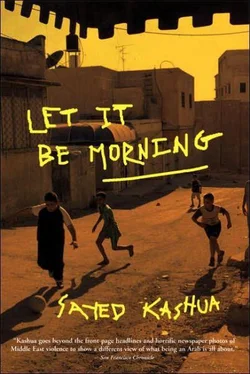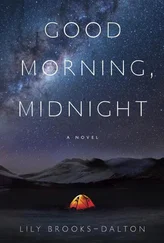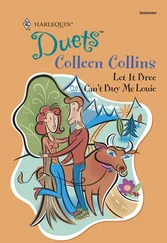The mayor chooses one of them, who may look a little older than the rest, and orders him to go to the head of the line. The worker pleads, bends over, sobs, asks for pity in the name of God, and the mayor explains there’s no choice. “It’s all because of people like you,” one of the local young men shouts at him. “You wanted al-Aqsa, didn’t you? Well, you’re on your own. Just look what a mess you’ve made for us.”
Trembling all over, practically naked, the first worker climbs up onto the planks, carrying a flag in his hand. He tries to cross over, step by step, slowly, getting down on all fours and inching his way forward over the body of the first worker who was shot. Another shot is heard. The second worker doesn’t move. He’s lying on top of the first one. A great cry cuts through the air. The workers begin shouting with all their might, heart-rending cries, weeping and sobbing. Many of the villagers are shouting too. “ Haram, enough, they don’t want them.” More and more people arrive at the scene. Women too. The older women, who are supposed to wear a white kerchief, rush toward the roadblock, crying and begging for the workers to be allowed to leave, protecting them with their own bodies. They shout at the mayor and his men and swear that God should make them burn in hell. They grab the planks that have been laid across the barbed wire and try to use them to pull away the two bodies. The body of the second worker, the one in underpants, falls over to the other side. The women succeed in pulling in the first one. The men all move away. Only the women and children remain. The workers, weeping, gather up their clothing. Nobody speaks to them.
The commotion at the entrance is over. Just a few children remain, patrolling near the roadblock on their bikes and watching the soldiers and the tanks. I walk back, passing by the fountain that the mayor had dedicated with much pomp and circumstance, which was supposed to welcome the Saturday shoppers into the village. The fountain isn’t working. There’s no electricity. The water seems dirtier than ever. Cans and cigarette butts and other trash thrown in by the thousands who have huddled at the village entrance over the past two days are floating on the water.
Shopkeepers are standing in the doorways of their stores watching the crowd and waiting to find out what’s going to happen. The shops aren’t exactly open for business. Almost all of them make do with a small opening, by lifting the metal barrier only partway. That way the shopkeepers will be able to lock up in a hurry if the mayhem starts again. They’re here out of habit, but they came knowing perfectly well that they won’t be selling any furniture or appliances today. One of them, tall and fat, about fifty years old, is standing in the doorway of his grocery store holding a cup of coffee. I walk toward him, and when he sees me he asks from a distance, “What are you looking for?”
“Cigarettes.”
“Don’t have any,” he says, and rubs his hands together to indicate there’s almost nothing left.
The green garbage pails bearing the signature of the local council are fuller than ever. Their lids have been removed and the residents can pile up pyramids of garbage. There are heaps of garbage all around. There’s no more fuel for the garbage trucks. The farther you go up the street leading into the village, the higher the garbage, and the stench grows stronger with every step you take. Big bags of meat and dairy products that have gone bad have been thrown in the garbage or placed nearby. Swarms of flies, as well as cats and dogs, are fighting over the new treasures, more bountiful than anything they’d dared to expect in this village.
Isoon discover how badly I miscalculated when I decided to take a shortcut home by cutting through the village center. There’s no escaping the putrid smell coming from the piles of garbage that almost block off the little alleyways winding between the old homes in the village center, many of them a hundred years old or more. I try not to breathe through my nose and to take quick little breaths, holding the air in my lungs for as long as possible. What’s happened to these people? The garbage isn’t collected for one day and the village turns into one big dump? Never mind the ones who put out their garbage the day before, thinking it would be collected as usual. The real problem began with those big, ugly women with their heads covered in a kerchief, who just go on putting out their garbage and piling it higher and higher in the doorways. They must think of themselves as people with good hygiene. Why don’t the neighbors take some initiative and clean the neighborhood? Why don’t they move the garbage farther away to the outskirts of the village, for heaven’s sake? What are they thinking?
The children haven’t gone to school today and they’re using the day off as an opportunity to roam barefoot among the garbage pails, playing tag and hide-and-seek. A group of men huddle in an alleyway and surround two village council workers in blue coveralls who have come to deal with the sewage overflowing. The smell grows worse as you get closer. Some of the men cover their noses and watch the city workers trying to fix the problem, but to no avail. I hear one of them say there’s nothing to repair. The village sewage has been blocked from the outside, and they’ll have to wait till the powers that be unblock the pipe. This explanation doesn’t go over well with the crowd and some of them start shouting at the guys in the coveralls, saying they don’t know how to do their job. One of them takes advantage of the opportunity to curse the village council for not clearing the garbage. “Instead of handing over the Palestinian workers,” a large, middle-aged man in a gallabiyeh says, “you should have let them fix the garbage and the sewage. They’re much better at it than you are.” All the others laugh as if they’ve just heard a particularly amusing joke.
The café at the outskirts of the older part of the village is packed. Men of all ages fill the inner room and the courtyard. Many have nowhere to sit and they settle for drinking a cup of tea or coffee in plastic cups while standing up. At some of the tables, four men are playing cards. There’s no work today either, and nothing much to do except wait for the closure to end. The local workers woke up early out of habit, if they got to sleep at all, to check what happened after the West Bank workers had been handed over to the soldiers — hoping to hear they could now resume life as usual. Once they understood that the mayor’s plan had failed, there wasn’t much left for them to do, and a game of cards coupled with some café chitchat seemed like the ideal way to get through another day of idleness.
A group of high school students who’ve gathered at the school decide to stage another march, except that this time nobody is eager to join them. No more than a few dozen people take part. From time to time, one of them tries to lead the others in a refrain of protest cries, but this soon dies out. When they realize that their rally is doomed to fail, the students disperse and head home. They don’t even get as far as the roadblock at the entrance to the village. The old men go on sitting at the mosque, rolling tobacco. At the nearby cemetery the Palestinian workers are digging two graves. In one, they bury the worker that the women had managed to pull back. As for the one on the other side, all they can do is throw his clothing over the fence into the grave. They don’t cry. The burial takes place in silence and prayer.
At the entrance to the cemetery I see the lupinus seeds vendor. I haven’t seen him for years, with his green cart, the same one he used when I was still in elementary school. Nobody knew what his real name was. Everyone just called him Thurmus, the local word for lupinus. He used to show up every day when school got out, equipped with a tape recorder that he’d position next to his big bowl of thurmus seeds, and play his Egyptian songs. Everyone made fun of Thurmus. He looked strange, and his eyes would follow you everywhere. His eyes followed the shoppers even as he was scooping up the warm thurmus seeds from the vat and filling the bowls. He never missed the bowl, even though his gaze wasn’t focused on what he was doing. He’d stare right through you, never smiling, never talking with anyone. I was scared of him at first, and I wasn’t the only one. But everyone bought thurmus from him because it really was the best.
Читать дальше












